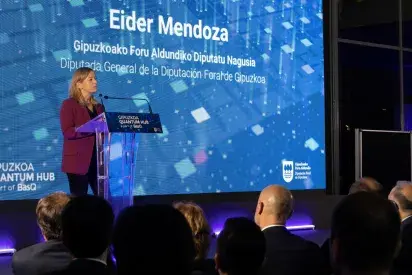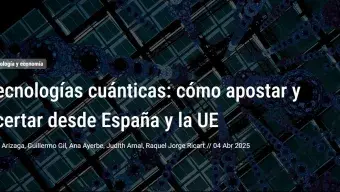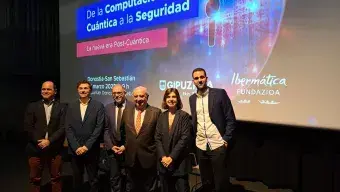Presentation of the ‘Gipuzkoa Quantum Hub’ Strategy
June 12, 2024The Provincial Council of Gipuzkoa presents the 'Gipuzkoa Quantum Hub' strategy, which focuses its efforts on value chain and entrepreneurship.

The Provincial Council of Gipuzkoa today presented the 'Gipuzkoa Quantum Hub' strategy to a broad representation of the economic, research, and knowledge sectors. The strategy aims to make Gipuzkoa one of the leading nodes for the development of quantum technologies in Europe by 2027. It emphasizes developing the value chain and entrepreneurship related to these technologies and complements the BasQ strategy of the Basque Government. In collaboration with BIC Gipuzkoa, a specific program called QuBic Accelerator will be launched to accelerate new quantum business projects, both local and international.
Deputy General Eider Mendoza opened the meeting, highlighting, “the capabilities we have been deploying for many years, which are the result of inter-institutional collaboration, intelligent specialization, and long-term vision. We have excellent R&D centers with significant scientific and patent production; cutting-edge technological infrastructures at a global level; a broad industrial base; a determined public commitment with joint investment between the Basque Government and the three Provincial Councils within the BasQ strategy; and universities with specific training,” she enumerated.
“With this strategy,” she explained, “we want to make the most of these strengths, emphasizing what we consider the area with the greatest potential for action: the value chain and entrepreneurship. We want all these capabilities to translate into new successful business initiatives that generate quality employment and new development opportunities. This is where we will focus all our efforts in Gipuzkoa, putting these technologies at the service of companies and attracting talent, investment, and economic activity from abroad, as part of our commitment to an innovative and advanced economy. We have everything we need to achieve it,” she assured.
According to Ane Insausti, Deputy for Economic Promotion and Strategic Projects, “efforts will focus on attracting entrepreneurs, startups, researchers, and technology companies with projects related to the development and application of quantum technologies.” Through the strategy and the accelerator, they will be offered “support to deploy and consolidate their initiatives,” including mentoring, personalized roadmaps, access to unique infrastructures, funding, and collaborative networks. During the program, they will receive personalized support in key business and market access areas, with the backing of experts in entrepreneurship, technology, and investments, through a panel of 30 members.
Given the sector's cross-disciplinary nature and the heterogeneity of potential beneficiaries, a tailored itinerary will be designed, including the possibility of obtaining initial public-private funding without losing participation, and access to grants and the investment industry. Additionally, they will have access to networks formed by relevant agents in this field, such as startups, universities, and innovation agents, both local and international.
One of the most important aspects, the Deputy added, is that these new initiatives will have access to “cutting-edge technological infrastructures at an international level,” such as the IBM Quantum One quantum supercomputer, the sixth of its kind in the world, being built in Donostia as part of the joint strategy driven by the Basque Government, BasQ. They will also have access to unique infrastructures of the Basque Science and Technology Network already in operation, such as those at DIPC (Hyperion supercomputer, cold atom laboratory...), CIC Nanogune, and the Material Physics Center.
Leading Companies Experimenting
Between 2021 and 2023, the Provincial Council allocated €3,073,256 in grants, enabling 11 research center and university projects and 23 projects from companies and business R&D units (12 leading companies and 11 SMEs) to be carried out. Thus, renowned Gipuzkoa companies of various profiles have been exploring the possibilities offered by these technologies in their respective fields of activity, in terms of problem-solving, new applications, services, products, and process optimization.
“We want to promote not only basic research but also the development of companies in quantum technologies, betting on industrial research and the transfer of advanced knowledge. The development of quantum technologies can be a significant lever of innovation and competitiveness for our economic fabric. We do not know exactly where these technologies will take us, but we want to be ahead because we know the path to an even more innovative and competitive economy that generates opportunities and well-being for all: experimentation and collaboration,” emphasized Mendoza.
Nine participating companies shared their experiences at today’s meeting: CAF (energy consumption optimization and mixed hybridization), AVS (radiation power estimation), Real Sociedad (injury situation prediction), Fagor Electrónica (hybrid electric circuits for qubits), ViveBiotech (research for gene therapy discovery), Simune (quantum computing for materials and software for automating spin-qubit design), Danobat (optimization of predictive maintenance of industrial machines), Iberdrola (distributed energy storage), and Opscura (post-quantum algorithms for industrial networks).
The meeting concluded with a round table moderated by Ainhoa Aizpuru from BIC Gipuzkoa, where representatives from entities that have provided expert guidance in the developed projects explained the current state of quantum technology applications: Roman Orús (co-founder and CSO of Multiverse), Iñigo Arizaga (director of Tecnalia Next – Quantum Technologies), and Aitor Moreno (head of Artificial Intelligence and Quantum Computing at Fundación Ibermática – Ayesa).
A Future-Oriented Field
Quantum technologies aim to harness properties that appear on a microscopic scale where Newtonian laws no longer apply, but quantum laws do. These phenomena at the subatomic level will enable the creation of highly disruptive technologies with a significant societal impact, bringing a paradigm shift in many fields. Quantum computing will solve previously unsolvable problems, facilitating optimization, the evolution of artificial intelligence, and managing large amounts of data. Quantum technologies will enable numerous applications across virtually all sectors: communications and encryption, medicine, energy, transport, industry, etc. Their impact is expected to be equivalent to that of traditional computing (current computers).
Source: Diputación Foral de GIpuzkoa



